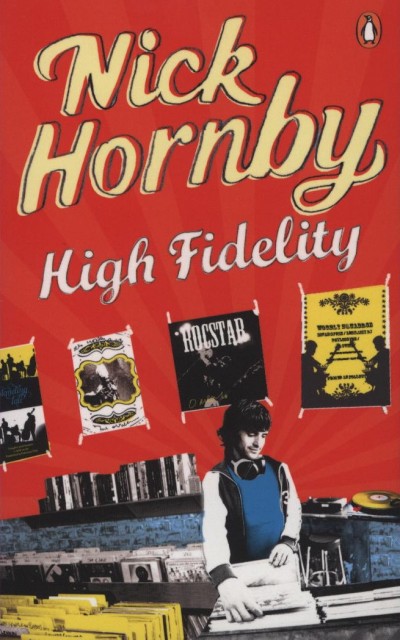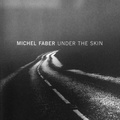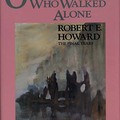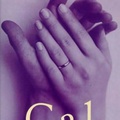Nick Hornby: High Fidelity

I used to be a fan of Nick Hornby but after his novel How to Be Good I stopped reading without discrimination everything he published because the didactic quality of his writings started to annoy me big-time. Starting from then, I usually read one out of every two of his books, but with each new novel I get more and more irritated by the way he spoonfeeds me and then I lay him aside again for another couple of years.
And after being a Hornby fan for several years, I would hazard the opinion that he managed to create his pop-philosophical masterpiece right with his first novel, High Fidelity, and he didn’t produce any other book as good as this one. But High Fidelity is such an excellent novel that I’ve been re-reading it for more than ten years now, and even though my taste in literature has undergone a couple of changes in this period, I enjoy this novel just as much as I enjoyed it for the first time. (Or wait a minute: I guess I’m enjoying it more and more with each re-reading.)
The story is fairly well-known I guess, but I happen to love speaking about this book, so I also provide you with a short plot summary. The protagonist of the novel is Rob Fleming, a thirty-five year old record shop owner whose whole life revolves around pop music: at work he compiles top five lists of the best side one, track one songs of all time or the best sitar solos appearing on side two of the world music albums published in 1991 (okay, he doesn’t do the second list – but I could well imagine him doing it); at home he manages his collection of several thousand records; and in the meantime he contemplates such questions as the relation existing between a love for pop music and the tendency to become a self-pitying, melancholy sort of person.
And after being a Hornby fan for several years, I would hazard the opinion that he managed to create his pop-philosophical masterpiece right with his first novel, High Fidelity, and he didn’t produce any other book as good as this one. But High Fidelity is such an excellent novel that I’ve been re-reading it for more than ten years now, and even though my taste in literature has undergone a couple of changes in this period, I enjoy this novel just as much as I enjoyed it for the first time. (Or wait a minute: I guess I’m enjoying it more and more with each re-reading.)
The story is fairly well-known I guess, but I happen to love speaking about this book, so I also provide you with a short plot summary. The protagonist of the novel is Rob Fleming, a thirty-five year old record shop owner whose whole life revolves around pop music: at work he compiles top five lists of the best side one, track one songs of all time or the best sitar solos appearing on side two of the world music albums published in 1991 (okay, he doesn’t do the second list – but I could well imagine him doing it); at home he manages his collection of several thousand records; and in the meantime he contemplates such questions as the relation existing between a love for pop music and the tendency to become a self-pitying, melancholy sort of person.
Apart from a large record collection, Rob also has a girlfriend, Laura, who just happens to split up with him at the beginning of the story. After the split-up Rob becomes seriously depressed and he decides to contact his ex-girlfriends in order to find out why all his girlfriends had left him. The novel is partly the story of this quest and partly the story of Rob’s and Laura’s life after the break-up.
Instead of my usual long and meandering ruminations, right now I only what to say that this is a very good book. It’s as „typically” English as it gets, it features a whole array of memorable characters, and it’s funny and melancholy at the same time – and Hornby mixes the fun and the melancholy in such an eerie, clever way that I can’t help smiling even while reading the saddest episodes or Rob’s most depressed musings.
Probably I’m not the first person to point this parallel out, but this novel is very much like the male version of Bridget Jones’s Diary. The only (but major) difference is that I find Bridget Jones’s hysterical ways rather exaggerated and tiresome even as a woman (so – even though I don’t consider Fielding’s novel a typical chic lit book – I wouldn’t try to convince all my male acquaintances to read that book to learn about women's ways), but I don’t have any problem with Rob Fleming’s male hysterics because it’s very life-like without being annoyingly tiresome and it can easily be understood by everyone regardless of gender.
What’s more, High Fidelity is full of very entertaining pieces of (pop) philosophy and I remembered from my earlier re-reading that this was one of those books from which you can quote dozens of funny and self-ironic observations. However, now I found that it’s not that easy to quote from this novel after all because most of the sad-funny pop-wisdom works the best in the context of several pages or the whole story. And actually I don’t mind this because this implies that Rob’s jokes and observations are not just some stand-alone good sentences but they sit well in the story-telling parts of the book. So the best you can do is to sit down and read this novel. And then re-read it again later – because High Fidelity is a hugely entertaining and likeable novel even for the umpteenth time.
Instead of my usual long and meandering ruminations, right now I only what to say that this is a very good book. It’s as „typically” English as it gets, it features a whole array of memorable characters, and it’s funny and melancholy at the same time – and Hornby mixes the fun and the melancholy in such an eerie, clever way that I can’t help smiling even while reading the saddest episodes or Rob’s most depressed musings.
Probably I’m not the first person to point this parallel out, but this novel is very much like the male version of Bridget Jones’s Diary. The only (but major) difference is that I find Bridget Jones’s hysterical ways rather exaggerated and tiresome even as a woman (so – even though I don’t consider Fielding’s novel a typical chic lit book – I wouldn’t try to convince all my male acquaintances to read that book to learn about women's ways), but I don’t have any problem with Rob Fleming’s male hysterics because it’s very life-like without being annoyingly tiresome and it can easily be understood by everyone regardless of gender.
What’s more, High Fidelity is full of very entertaining pieces of (pop) philosophy and I remembered from my earlier re-reading that this was one of those books from which you can quote dozens of funny and self-ironic observations. However, now I found that it’s not that easy to quote from this novel after all because most of the sad-funny pop-wisdom works the best in the context of several pages or the whole story. And actually I don’t mind this because this implies that Rob’s jokes and observations are not just some stand-alone good sentences but they sit well in the story-telling parts of the book. So the best you can do is to sit down and read this novel. And then re-read it again later – because High Fidelity is a hugely entertaining and likeable novel even for the umpteenth time.





